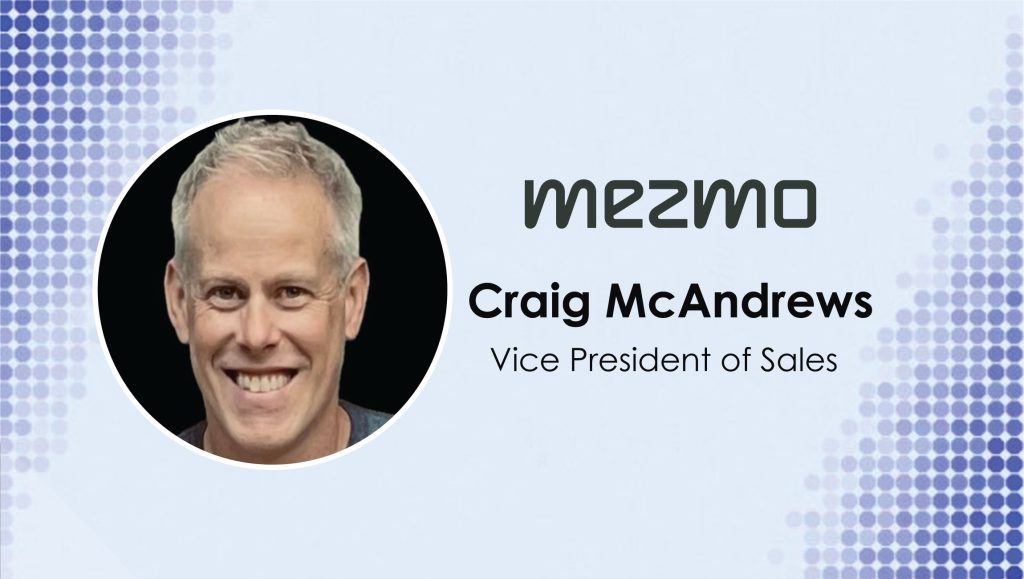While latest enhancements in AI can transform the modern sales experience; it is crucial to keep in mind that AI still can’t replace human judgement; Craig McAndrews, Vice President of Sales at Mezmo comments further:
___________
Welcome to this SalesTech Series chat, Craig. Tell us about your B2B sales journey and what inspires you most about being in sales.
My career began on Wall Street, but my fascination with technology led me to transition into the financial technology sector, specializing in consulting and implementations. However, I quickly discovered that my true strength lay in understanding business challenges and using technology to solve them rather than implementing or managing the tech. Inspired by observing successful salespeople, I realized that effective sales is about acting as a consultant and working with customers to find solutions.
Fueled by curiosity, I spent several years working with various emerging technologies reshaping industries, including search engine marketing, customer experience analytics, eCommerce, infrastructure and security as code, AI, and now telemetry pipelines and observability. What inspires me most is being at the forefront of these technologies and witnessing their transformative impact on businesses. Additionally, I value the opportunity to build strong business relationships along the way.
How in your view can modern sales teams build better business and client relationships? What works well in the B2B tech market?
Sales teams in the B2B tech market can enhance business and client relationships by positioning themselves as trusted advisors. In the emerging technology space, it’s important to establish ourselves, our team, and our company as someone who can help clients navigate challenging and uncertain times.
In the B2B tech market, people don’t want to feel like they are being sold to, particularly in highly technical areas. They’re knowledgeable about their fields and incredibly busy, so they don’t have time to waste with salespeople who don’t understand their problems. This means salespeople must invest more time upfront to understand their clients’ needs and pain points.
Drawing from my consulting background, I’ve learned that successful engagements depend on effective communication and a deep understanding of the challenges faced by the buyer. To be seen as trusted advisors, we must convey knowledge of their situation and offer intelligent solutions to meet their needs. Without this, we lose credibility, and our recommendations may be dismissed as irrelevant.
Given the rapid pace of technological change, clients appreciate when we offer a unique approach and demonstrate our ability to truly help them. By consistently proving our value and adaptability, we can strengthen our relationships and drive success in the B2B tech market.
Read More: SalesTechStar Interview with Lindsey Chambers, Regional VP of Sales – US, Exclaimer
Take us through your sales strategies and processes that have worked well over the years and the salestech and revtech that enabled them.
Over the years, I’ve found that successful sales strategies revolve around a few fundamental pillars. First, alignment is crucial. It’s important to ensure that everyone from the board and CEO to the newest sales development representatives (SDRs) shares a common understanding of the current situation and what it takes to succeed. Even the best products and teams may not reach their full potential without alignment. Second, having the right people is critical. This means selecting individuals who have the necessary skills for the job, align with the company’s stage and market segment, and possess the right mindset for success.
Furthermore, proper enablement is essential. It’s not enough to equip the team once. They need continuous support and training to perform at their best. This encompasses discipline in key areas such as prospecting for account executives and SDRs and careful management of opportunities from stage to stage. Continuous tracking and measurement are also crucial. By monitoring performance and analyzing data, we can learn and improve our strategies to adapt to changing circumstances.
In terms of technology, certain tools have proven useful. A CRM serves as a central source of information, providing accurate reporting and maintaining alignment across the team. I’m a big fan of Clari for its ease of use and forecasting capabilities. Solutions for meeting recording, transcription, and summary also streamline communication and collaboration. I’ve also found company data solutions invaluable for identifying and targeting prospects that align with our ideal customer profile. Tools like LinkedIn Sales Navigator have also proven effective for prospecting and building relationships.
While there’s no magical formula for sales success, focusing on these fundamental pillars and leveraging the right sales and revenue technology can significantly enhance effectiveness and drive results.
Can you talk about the impact of AI on modern B2B sales and how it’s changing the game for sellers today?
AI transforms modern B2B sales by streamlining processes and empowering sellers with valuable insights and efficiency. The upfront effort required for salespeople to gather intelligence has significantly decreased thanks to AI.
AI-powered tools can quickly analyze large amounts of data from various sources, like news and financial reports, to identify a company’s top initiatives and challenges. This enables sellers to create personalized and impactful messages without spending hours researching. AI can also assist in proofreading written communication, ensuring accurate grammar and appropriate tone.
With call recording technology, AI-driven features offer invaluable assistance in making opportunity updates, extracting key insights like competitive intelligence, and providing opportunities for sales enablement. Furthermore, AI can benefit forecasting, providing more accurate predictions based on data analysis and trends.
However, it’s important to recognize that while AI enhances efficiency and effectiveness, it can’t replace human judgment and insight. We can’t simply prompt ChatGPT to write our emails without reviewing and tweaking them or make forecasts based on some prediction without proper inspection of each deal.
What are some of the top trends that will drive the B2B tech and SaaS market in 2024?
In 2024, AI will continue to evolve rapidly and be a leading trend for a while. We’re still in the early stages of its development, but it will become increasingly integrated into various business operations to varying degrees of success. Companies struggle to effectively manage, understand, and make their data actionable. Until they can fully harness their data’s potential, they won’t be able to fully realize AI’s capabilities.
Data serves as the lifeblood of AI systems, and the demand for data and the ability to control it will only grow more intensive. As a result, there will be an increasing need for better tools to manage data effectively, addressing challenges related to security, governance, and accessibility.
Read More: How Sales Enablement Platforms Bridge the Gap between Marketing and Sales
If you had to share a few AI trends that will lead the salestech-martech space in 2024 and beyond, what would you talk about?
While personalization has long been a focus, we’re now on the cusp of a significant shift toward true individual-based personalization. Instead of just tailoring content to broad cohorts or personas, advancements in AI technology are allowing businesses to finely tune their approaches to individual consumers. This more precise level of personalization has the potential to deliver better experiences and drive improved business results.
We will need enhanced controls with greater demand and utilization of data, especially with generative AI use cases. We should expect to see this as a big area of growth for tech over the next few years.
Mezmo provides a central observability platform to help control, enrich, and correlate machine data to make business decisions faster.
Craig McAndrews is Vice President of Sales at Mezmo





















